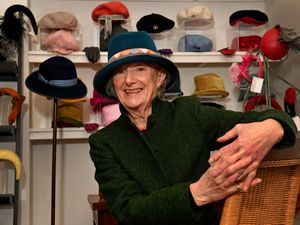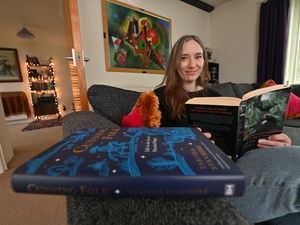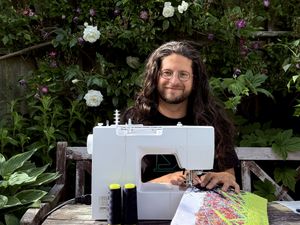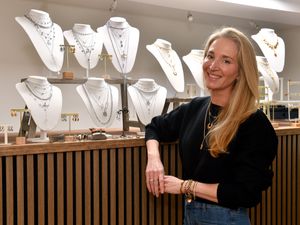DNA: It's gene-ius - our reporters find out what makes them who they are
Due to the popularity of shows such as the BBC's Who Do You Think You Are?, most of us are intrigued to find out more about ourselves.

We're no different and quickly found that researching the world of genetics and ancestry doesn't have to be difficult or costly.
Our curiosity got the better of us and we went on a mission to investigate our make-up.
An American company, 23andMe, is pioneering new and easily-accessible DNA tests. For just £125 who can find out more about you and your heritage than you could ever have expected.
And all it takes is a sample of your spit. So Weekend set colleagues Lisa Wright, Rob Golledge, and Keith Harrison the challenge to find out who they really are.
And the results may surprise you...
DNA tests may be the fodder of Jeremy Kyle – but they can provide a fascinating insight into your heritage and may even save your life.
There are obvious quirks too, like perhaps finding out if you are related to someone famous.
And there is a genuine fascination about finding out what far corners of the planet your ancestors may once have inhabited.
Erynn Gordon, director of clinical development at DNA testing company 23andMe, explains: "Everybody is looking for something different whether it be for genealogy or health.
"The concept of genealogy fascinates everyone, it's a universal ideal. Just look at the interest there is when a new artefact is discovered or new clues to our past uncovered. We all want to know who we are and until recently very little was known to that affect.
"If you are missing information about your parents or grandparents it can help you fill the gaps."
Health is a major reason for taking the test as the results can point to inherited conditions or traits which may put you at more risk of some diseases.
She says: "For example familial hypercholesterolemia is an inherited form of high cholesterol that can attribute to risk of heart disease but can be overlooked.
"Our test will flag up if you have this genetic risk factor.
"Now it is important all your medical advice comes from your doctor, but you can discuss this with them and it can inform them and they may want to look at it or take it into consideration.
"The test is not a diagnosis but highlights risk factors.
"It can also inform your family planning.
"For example you may not know that you are a carrier of an inherited condition like Sickle Cell Anemia.
"If you and your partner both know what conditions you both have it, in discussion with health care professionals it can inform any decisions about family planning."
And the best bit is the test is simple to take.
You register online, answer some questions about your personal details and then spit into a special tube and put it in the post.
In a laboratory across the pond the specimen is analysed and a profile of your DNA created.
Then after waiting patiently for a couple of weeks an email will drop announcing that your results have arrived – cue much excitement.
With the innovative ancestry composition tool, 23andMe breaks down what per cent of an individual's DNA comes from different populations around the world.
The test can inform you about your maternal and paternal lines and even tell what per cent of your DNA came from the Neanderthals.
23andMe can also match customers to relatives – both distant and close – and collaborates with the family history site MyHeritage to provide an enhanced family tree.
But how does it work and what is the science behind it?
Genetic information is inside each of us, in every cell of our bodies and provides a blueprint for what makes us who we are. It tells a story about your past, present and future, informs you about your health, your risk for certain diseases, traits you may pass onto your children and the ancestry you inherit from your parents.
The Human Genome Project, the landmark effort to sequence the DNA of our species, was completed in 2003 after 13 years of research and a cost of £2 billion. Today, sequencing a single human genome can take as little as 48 hours and costs less than £1,000. Yet while that cost of sequencing the human genome has plummeted, the value of that information has soared as we learn more and more about the genetic underpinnings of diseases, traits and human evolution.
Genomics England was set up by the Department of Health in 2013 to sequence 100,000 whole genomes from NHS patients by 2017. This bold project positions the NHS as a world leader in genetic research for patient benefit and demonstrates its commitment to genetic-driven healthcare innovations. By becoming the first country ever to introduce genetic technology in its mainstream health system, the UK is a pioneer in this field.
This climate of discovery and innovation is the perfect environment not only for finding out who we are and where we come from but also in developing treatments, cures and a more personalised approach to patient care.

With my mixed race heritage – my father is from Jamaica, while my mother is a Brummie with Welsh roots – I was interested to see what the results would hold.
So a simple DNA test seemed a quick and easy way to get an insight into what I'm made of.
Spit in a tube, send it off, wait for the results. Simples.
And what did I find out? Well, in all honesty, I'm still trying to process the information and figure out what it all means.
Some bits are easy, and for me the physical traits section was the easiest – and most fun.
And bar a few random answers – blonde hair – 10 per cent chance, eh? – it was pretty much spot on.
Eye colour – likely brown. Check.
Hair curl – slightly curlier on average. Bang on.
Male pattern baldness – not applicable. Phew.
Earwax type – wet. Erm, I guess so!
Odour detection – typical sensitivity to sweaty odour. *insert laughing emoji here*
But aside from the obvious, I was really interested to find out what the DNA could determine about me, just from a saliva sample.
My ancestry composition tells me that I'm 54.7 per cent European, including 19.6 per cent British and Irish, while the remainder is 44.7 per cent Sub- Saharan African, including 42.4 per cent West African – which I guess pretty much explains the European/Jamaican heritage.
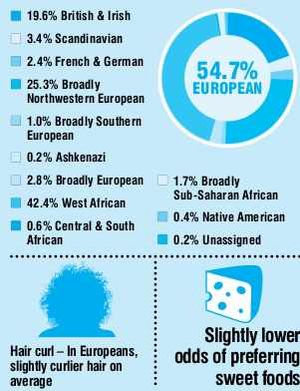
But the part that really piqued my interest was the health overview – namely the genetic risk factors.
These reports show your results for specific genetic variants that are associated with a higher risk for developing certain health conditions.
However, what they can't tell you is whether you definitely will, or won't, develop the condition.
My colleague Rob warned me that you have to tick a special box to unlock the data – as understandably some people may not want to see it. But the intrigue got the better of me and before I knew it I was looking at a screen that told me I had a variant that is associated
with higher risk for developing Alzheimer's disease.
In all fairness, it came as no big surprise, my nan had the condition.
But do I really want to know?
I'm not sure I'd do it again. It's not really something I want hanging over me. I'd rather just not know. Besides, I told my mum and she cried – and nobody wants that.
Overall, I found the test an interesting insight into my genetics I did find the data quite complicated and you really have to sift through it to make any sense of it at all.
I've always been more interested in looking to the future and where I am heading rather than looking back at where I come from sort of chap, as pretentious as it sounds.

But it is a question I have been asked a lot – you can't have a surname like Golledge without folk passing comment that it's an 'unusual name', aka odd, and asking about its origin.
Somehow the response 'the West Country' never seems to cut the mustard.
Similarly, on my father's side of the family the men tend to have a slightly darker skin complexion which often leads to speculation.
Purporting to have Italian or Iberian heritage sounds a lot more exotic and interesting than just off the M5.
So what has my DNA test found?
Well, I am 57.7 per cent British and Irish – encouraging; 12.8 per cent French and German – I love the EU, really; 1.7 per cent Scandinavian – that'll be the Vikings; and 0.1 per cent unassigned.
Wait a minute. Unassigned?
What does that mean?
Am I part-alien?
A sub-tropic ancient species yet to be discovered?
The abominable snowman?
Suddenly I had more questions than answers.
But I think I'll opt for 'next stage of the evolutionary process'. A sort of Advanced Human.
After all it makes sense.
According to the DNA test I have an increased episodic memory. That means I can recall and remember events and information better than the average person. Quite handy for a journalist.
Don't be jealous, I'm just brighter than you.
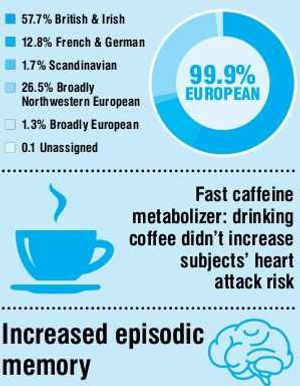
It certainly brought comfort when I found out I was 2.6 per cent Neanderthal, though apparently this is slightly below average so leave your knuckle-dragging comments to yourselves.
There are also a few other fascinating nuggets of information.
My mother's line of heritage goes back 13,000 years to just after the Ice Age and the ancient Doggerland (fittingly I now live near Cannock Chase) while my father's line goes back 17,000 years with possible Basque links – maybe that explains the olive skin pigmentation.
So I am exotic after all ...hello ladies..!
Meanwhile, I'll just skirt around the increased odds of male pattern baldness – these things can be wrong, right?
I also found it interesting that from my DNA the experts can tell that my body is a fast metaboliser of caffeine, meaning I can drink copious amounts of Nescafé without increasing the risk of heart attack.
You don't have any secret lovechildren do you?
"Err. Not that I know of," I laughed, perhaps a bit too nervously. They thought I was joking – I think I got away with it.
So I spent the next 25 minutes spitting into a tiny test tube, growing more dry-mouthed and feeling sicker and sicker as my gooey little sample slowly edged towards the line marking the required amount.

This was not pleasant. In fact, t'was gross, if truth be told. A test tube half full of gob. Yuk. I'm
getting too old for this spit.
Where's Bob Carolgees and his dog when you need him?
Nevertheless I ploughed on, in the hope it would throw up the right results.
My specific area of interest was ancestry but I wondered if any of my forefathers had ever spent so long trying to deliver a 'sample'.
Turns out, I'm 2.5 per cent Neanderthal so possibly yes.
Nothing special in this, really, as most people are around the same.
I'm slightly below average but that does still put me '2nd among my friends'.
(I didn't know any of my friends had done DNA tests, but frankly, it doesn't surprise me.)
Anyway, 23andme offers a helpful note about what this may mean: "We don't know yet if having higher than average Neanderthal DNA could explain why someone is extra brawny, short or boorish.
Those traits might just be regular human characteristics." So there, friends. God forbid that I should ever be boorish, but if I am, there's a scientific explanation. Don't blame me – it's
in my genes.
And if you don't accept it, I'll come round your hut and batter you with a club like Captain Caveman.
On spinach.
Now, Neanderthals died out 40,000 years ago, but the test shows my roots even further back.
Apparently, on both my mother and father's line I have ancestry going back to East Africa 50,000 years ago.
Again, this is not unusual apparently.
Nor is it strange that I am 0.8 per cent Italian (probably Roman).
Slightly more significant is the 5.3 per cent Scandinavian DNA, the 32 per cent that is 'broadly North Western European' and the 51 per cent British and Irish.
I defy anyone to see such information and not be fascinated.
And I suddenly realised that I – along with many other indigenous Brits – am a walking history specimen brought together over thousands of years.
Out of Africa, Roman, Viking, Germanic, Norman and according to this '100 per cent European' – this was before I voted last week, mind you.
The useful breakdown of my spitoon also tells me that I have 798 DNA relatives on 23andMe.com and even what their surnames are (Harper, Ward, Jones, phew).
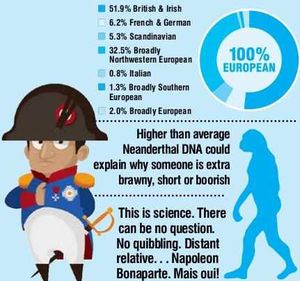
Suitably relieved, I clocked the website's piece de resistance – FAMOUS relatives.
Now, bear in mind dear reader, this is not some cod psychic on Blackpool front telling you that you were Florence Nightingale in a former life.
This is science. There can be no question.
No quibbling. This is gene genie fact.
And I've landed a big one.
Madames et monsieurs I give you my distant relative. . . Napoleon Bonaparte.
A charismatic genius with a persecution complex, intent on world domination? Well, c'est moi in a nutshell.
Vive la spit!

